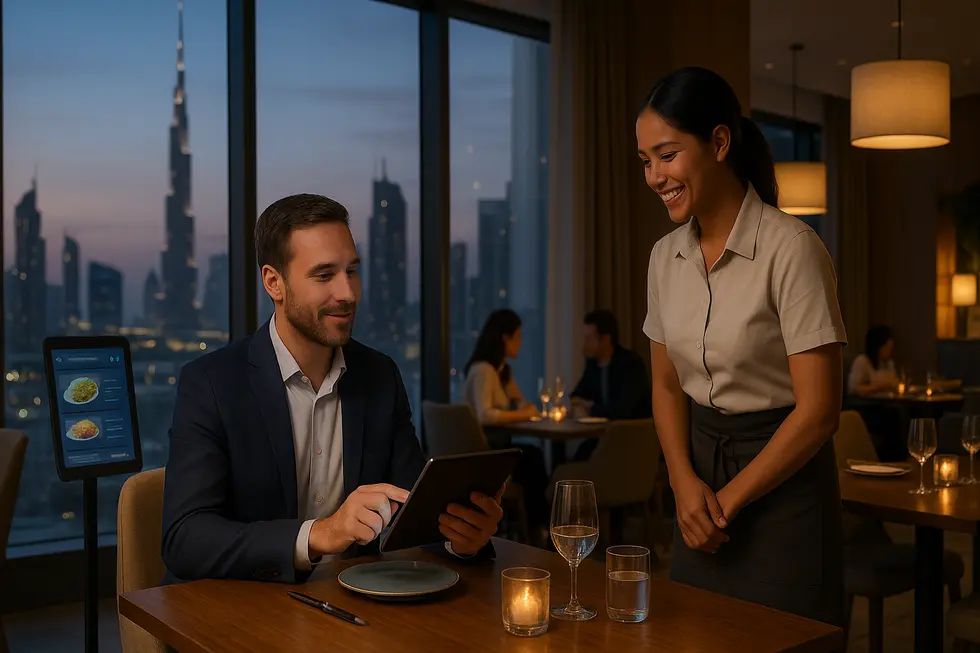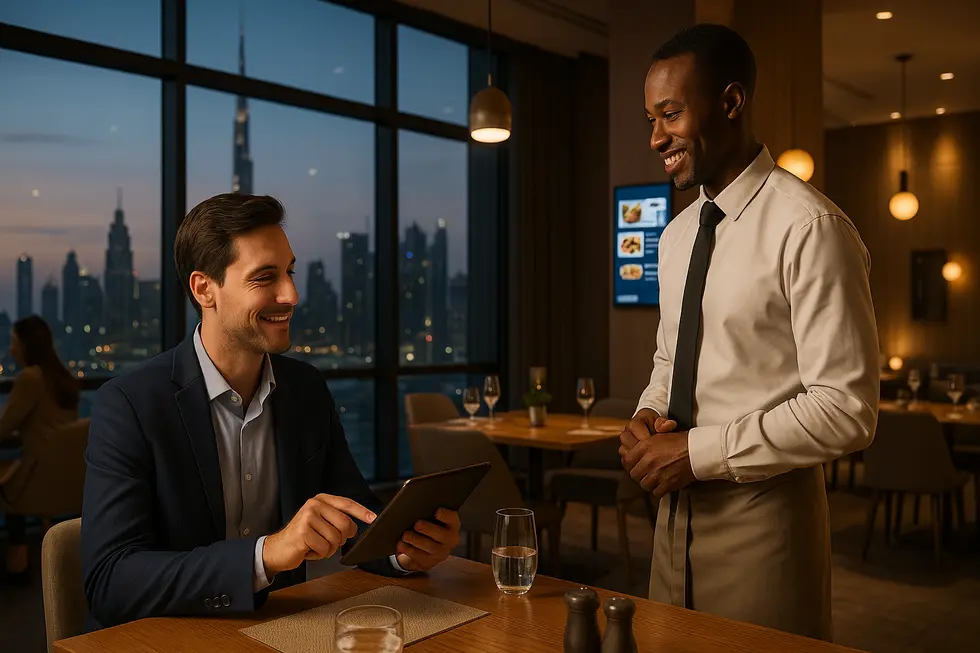7 Practical Ways Dubai Hotels Revolutionise Restaurant Guest Experience with AI and Digital Personalisation
Dubai hotels restaurant guest experience improved with AI personalization, digital ordering, and contactless security to boost satisfaction and revenue.
Customer Loyalty & Guest Experience
Digital Personalization and AI: Reimagining Dubai Hotel Restaurant Experiences
 Digital personalization and AI-driven technologies are transforming how hotel restaurants anticipate and delight guests. By unifying guest data, menus, wellness inputs and marketing touchpoints, hotels create coherent dining journeys that feel curated rather than automated. Digital menus let guests filter by allergens, diet and taste. Multilingual interfaces remove language friction for international visitors. Profiles remember preferences across visits, so returning guests see suggested dishes and familiar table settings. AI analyzes past orders and can propose meal pairings that match individual palates.
Digital personalization and AI-driven technologies are transforming how hotel restaurants anticipate and delight guests. By unifying guest data, menus, wellness inputs and marketing touchpoints, hotels create coherent dining journeys that feel curated rather than automated. Digital menus let guests filter by allergens, diet and taste. Multilingual interfaces remove language friction for international visitors. Profiles remember preferences across visits, so returning guests see suggested dishes and familiar table settings. AI analyzes past orders and can propose meal pairings that match individual palates.
AI also extends into culinary creativity and immersive service. Collaborative systems work alongside chefs to test flavor pairings, refine recipes for consistency, and scale seasonal menus with less waste. In the dining room, ambience can shift automatically to match guest tastes. Lighting, playlist choices and temperature settings adjust when a guest reserves a table. These adjustments are subtle yet powerful, making each meal feel intentionally designed.
Wellness-driven personalization ties sleep, nutrition and activity data to dining options. When guests indicate dietary goals or sleep concerns, the system recommends menus that support rest and recovery. Wellness suggestions can arrive pre-arrival, influencing meal choices and spa bookings. AI also helps hotels meet sustainability targets. Predictive demand models reduce over-ordering and food waste. Supply chains become leaner, cutting costs while highlighting sustainable menu items to eco-conscious diners.
Operationally, digital ordering and AI concierges reduce routine tasks for staff. Fewer phone calls and manual re-entries free teams to focus on high-value interactions. Real-time reputation tools monitor reviews and social mentions, enabling swift, personalized responses that reinforce brand trust. Marketing becomes more targeted, too. Chatbots on messaging apps drive bookings and answer queries at any hour. Virtual previews let guests explore menus and spaces before arrival, increasing conversion.
Integrating these technologies requires focus on UX, staff reskilling and robust data governance. Start with a trusted, guest-centered digital menu, then expand into AI recommendations and environment syncing. For practical strategies on using F&B tech to grow loyalty, see the hotel's guide to F&B build guest loyalty. Further reading on digital menus and personalization is available here: https://cherrymenu.com/2024/07/10/personalized-dining-how-digital-menus-are-transforming-the-dubai-restaurant-experience/
Operational Precision: Streamlining Workflows, Staff Roles and Costs to Elevate Restaurant Guest Experience
 Operational levers that reshape service workflows
Operational levers that reshape service workflows
Operational efficiency is the backbone of any memorable dining experience in Dubai hotels. Central to that efficiency is smarter procurement and inventory control. Partnering with reliable bulk food suppliers reduces unit costs and secures stock during peak periods. When combined with real-time inventory software, teams gain predictive restocking and shrinkage alerts. That dual approach reduces waste and frees managers to focus on service quality instead of chasing supplies.
Clear SOPs and targeted training translate procurement gains into consistent guest-facing performance. Daily checklists, role-specific KPIs and review-linked incentives create accountability. Staff know which tasks matter and when to escalate issues. This consistency raises guest satisfaction and encourages repeat bookings through dependable service moments.
Automation of routine workflows removes friction across the restaurant. Digital order routing, table management systems, and integrated feedback tools shorten turnaround times. Automation catches errors early and gives staff a clear picture of demand peaks. With fewer manual interruptions, front-of-house teams can concentrate on personalized interactions instead of administrative tasks.
Compliance and quality assurance must be embedded into daily operations. Adhering to licensing, food safety and certification standards protects brand reputation. Regular audits, supplier scorecards and documented corrective actions reduce risk and reassure international guests. These processes also simplify inspections and reduce costly disruptions.
Redesigning staff roles for flexibility amplifies efficiency. Cross-trained servers, expedited back-of-house roles, and a performance matrix allow dynamic task allocation during busy shifts. This reduces bottlenecks, shortens service cycles and lowers food wastage by aligning kitchen output with real-time demand.
A guest-centric service design ties operational precision to emotional impact. Seamless coordination between reservations, table setup and kitchen timing crafts moments that feel effortless to guests. The best operational plans treat luxury service and back-office rigor as two halves of a single system.
Finally, targeted operational adjustments address Dubai’s cost pressures. Negotiating vendor contracts, optimizing rostering and expanding takeaway options protect margins while preserving experience. These measures, layered with technology and staff empowerment, create a resilient restaurant model that delivers consistent quality and scalable hospitality.
For guidance on aligning guest loyalty with F&B operations, see the Hotel F&B loyalty resource: Hotel F&B loyalty.
External source on bulk procurement and supply strategies: https://sourceinternational.ae/revolutionizing-hotel-operations-with-a-premier-bulk-food-supplier-in-uae-hotels/
Accessible, Multilingual and Contactless: Redesigning Dubai Hotel Restaurants for Inclusive, Secure Guest Journeys
 Every guest journey in a Dubai hotel restaurant must feel effortless, safe and personally relevant. Achieving that requires a coordinated approach that blends physical inclusivity, language fluency and contactless security into one coherent guest pathway. Start with a rigorous accessibility audit to remove physical barriers. Prioritise clear routes, accessible seating, high-contrast tactile signage, induction loop or portable hearing assistance, and a quiet sensory-friendly area. Complement physical changes with accessible printed materials: large-print menus, tactile inserts and pictogram-based options for common dietary needs.
Every guest journey in a Dubai hotel restaurant must feel effortless, safe and personally relevant. Achieving that requires a coordinated approach that blends physical inclusivity, language fluency and contactless security into one coherent guest pathway. Start with a rigorous accessibility audit to remove physical barriers. Prioritise clear routes, accessible seating, high-contrast tactile signage, induction loop or portable hearing assistance, and a quiet sensory-friendly area. Complement physical changes with accessible printed materials: large-print menus, tactile inserts and pictogram-based options for common dietary needs.
Digital access must match physical standards. Redevelop menus as responsive, WCAG-compliant pages rather than image PDFs. Add screen-reader labels, keyboard navigation and a voice option that reads menus and captures orders. Offer downloadable large-print files and a braille-on-request process. These digital touches reduce staff burden and broaden market reach while meeting compliance expectations.
Language is both practical and emotional. Use guest data to pick priority languages and localise all touchpoints, not merely translate them. Professional linguists should craft static assets like menus and legal text. For dynamic interactions, deploy multilingual chat workflows with human review, and provide staff with on-demand interpreter tools for complex requests. Capture language preference at booking and surface it in the CRM so hosts and servers can greet and serve in the guest’s chosen language.
Contactless flows must be secure and seamless. Implement QR-initiated web ordering, native app options and tablet-assisted ordering for staff. Use tokenization, point-to-point encryption, strong API security and up-to-date TLS for all web traffic. Define PCI compliance scope, schedule assessments, and adopt continuous fraud monitoring. Keeping card PANs out of property systems preserves trust.
Operationally, merge accessibility, language and security data into simple triggers for restaurant teams. When a booking flags mobility needs or allergy data, the host receives a clear prompt with seating and service instructions. Train staff on accessible assistance, multilingual basics and secure payment handling. Track KPIs such as contactless adoption, preference capture rate, CSAT for accessibility cohorts and chargeback frequency.
Continuous testing ties it together. Run usability sessions with people who use assistive tech and with non-native speakers. Iterate menus, signage and payment UX through measured A/B tests, and publish clear accessibility statements online. Incremental rollouts let teams prove value quickly and expand with confidence, boosting satisfaction and loyalty. For a detailed case study on digital guest experience, see this success story. For strategies linking F&B to guest loyalty, explore hotel-fandb-loyalty.
Final thoughts
Digital personalisation, AI-driven services, and seamless technology integration are powerful levers for 4-star hotels in Dubai to elevate restaurant guest experience. When used strategically, these tools increase revenue per cover, reduce operational friction, and free staff to deliver memorable hospitality moments. Equally important is implementing technologies with guest consent, accessible design, and privacy-first practices so digital convenience does not come at the cost of trust. Start with targeted pilots, measure operational and guest-centric KPIs, and scale what demonstrably improves satisfaction and loyalty. The result is a smarter, more personalised dining experience that aligns with Dubai's premium hospitality expectations. Let's design a guest journey they'll never forget – start the conversation now.
About us
Markus Mensch is a strategic marketing consultancy specialising in hospitality and F&B brands, with offices in Dubai and Germany. Since 2007, the company has supported over 1,000 businesses in increasing visibility, guest loyalty, and revenue – without relying on paid ads. With the proprietary OBC-Strategie®, Markus Mensch and his team provide structured, result-oriented solutions tailored to 4-star hotels and restaurants. The company combines marketing expertise, industry experience, and hands-on implementation to help clients achieve sustainable growth. Made in Germany – Built for Dubai
Transform Your Hospitality Business Today
Are you ready to boost your revenue and enhance guest loyalty? Let's get started!

